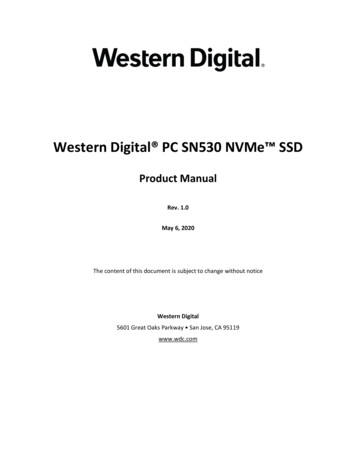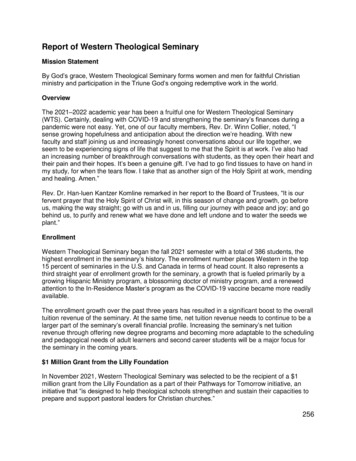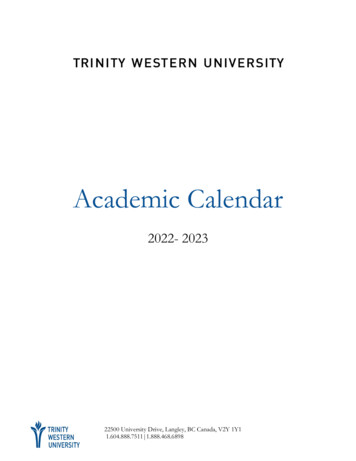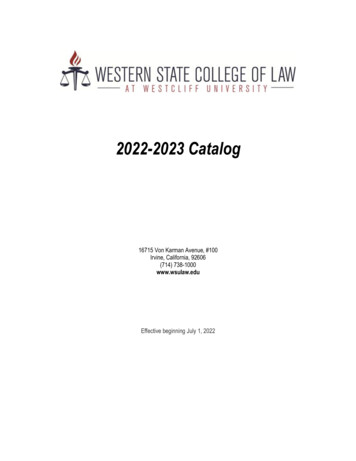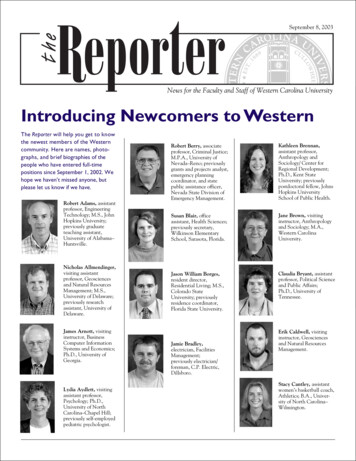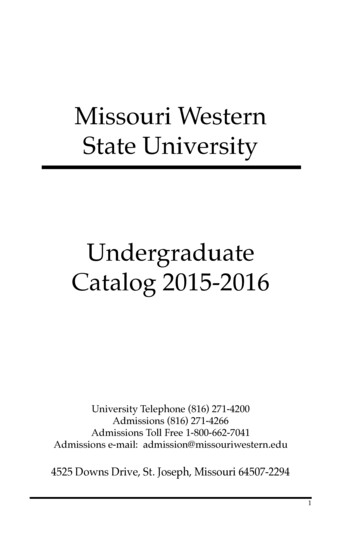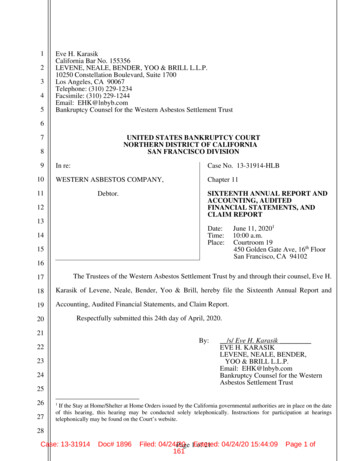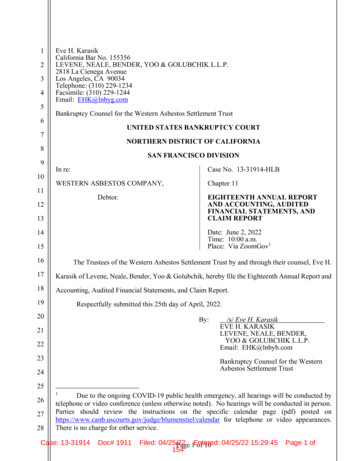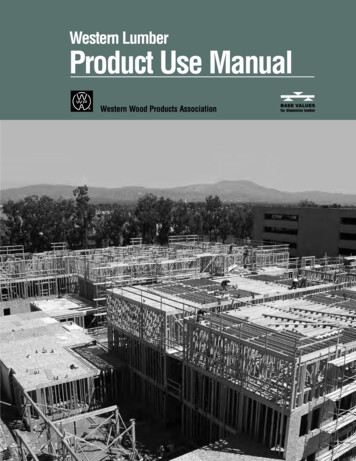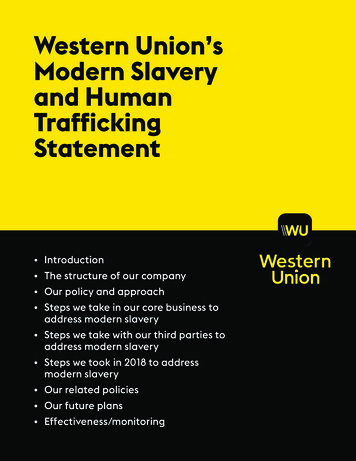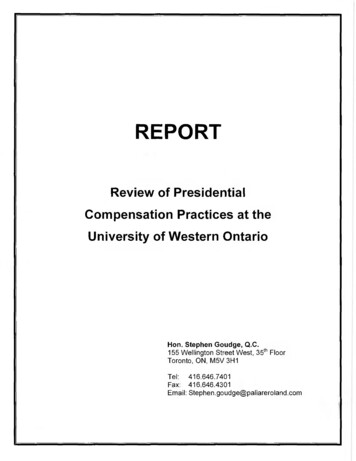
Transcription
REPORTReview of PresidentialCompensation Practices at theUniversity of Western OntarioHon. Stephen Goudge, Q.C.155 Wellington Street West, 35th FloorToronto, ON, M5V 3H1Tel: 416.646.7401Fax: 416.646.4301Email: Stephen.goudge@paliareroland.com
Review of Presidential Compensation Practicesat the University of Western OntarioIntroductionOn April 22, 2015, I was appointed by the Board of Governors of the University ofWestern Ontario to conduct an independent review of certain aspects of presidentialcompensation at Western.The review was initiated by the Board following the many expressions of seriousconcern raised by the decision of the President to draw a payment of 100% of his basesalary at the end of his first term, in lieu of a year of administrative leave, by mutualconsent and in accordance with the terms of his contract with Western.My terms of reference read as follows:Terms of ReferenceThe scope of the independent review is to consider and respond to the followingquestions:Are Western University's presidential compensation practices (includingbut not limited to salary, benefits and post-service provisions) in line withthose of peer institutions?2.Does the Board of Governors have the appropriate accountability andreporting mechanisms in place with respect to executive compensation? If
2not, what other mechanisms should be in place and/or what amendmentsto our current processes might be appropriate?3.(a)Is a contractual provision that grants a year-long administrativeleave at 100 percent of salary for each term in line with universitypresidents' contracts offered by peer institutions?(b)Is a provision that permits salary to be paid in lieu of taking a leavein line with presidential contracts offered by peer institutions?(c)In satisfying the contractual provisions for an administrative leavefor a sitting president in each term, what options are appropriatewith respect to such leaves between terms?In conducting my review, I have been given full cooperation by all at Western. I havehad full unimpeded access to all the information I considered relevant.Through the very helpful efforts of the University Secretary, I have obtained a significantnumber of contracts of senior administrators at other universities in Canada. With theable assistance of Deborah McKenna, a lawyer at Paliare Roland, I have conducted adetailed review of those contracts. I am very grateful to her. My review provides abasis of comparison with the experience at Western.To acquire as full an appreciation as possible of the factual context for my review I helda large number of interviews with senior officials at the University and leaders of themajor stakeholders in the Western community. A list of those I consulted is attached asWestern University Report:1612097 2
3Appendix A to my report. I express my thanks to all of them for their candour and theirfundamental desire to serve Western's best interests.In addition, I received and reviewed a large number of individual expressions of opinionfrom members of the Western community who responded by e-mail to my openinvitation to comment. 1 am grateful to them as well.I have found this information all very useful in the discharge of my mandate. Needlessto say however, the recommendations that follow are entirely my own. In advancingthem, I have sought to speak to the future in the hope that as a result of this painfulepisode, Western can move forward even stronger than it was.The Factual ContextDr. Amit Chakma was appointed President and Vice Chancellor effective July 1, 2009.Prior to that, he served as Vice President Academic and Provost of the University ofWaterloo.The first step leading to Dr. Chakma's appointment was a search process conducted bya Selection Committee of the Board of Governors that was struck in November 2007. Itwas made up of members elected by the Board and members elected by the UniversitySenate.The Selection Committee unanimously recommended to the Board ofGovernors that Dr. Chakma be appointed to a five year term as President of Western.The Senior Operations Committee of the Board then negotiated the terms of hisappointment withDr. Chakma.Western University Report:1612097 2Once that was concluded, that Committee
4recommended his appointment on those terms to the Board of Governors and the Boardagreed.At Western, the Board of Governors has formally delegated to the Senior OperationsCommittee the responsibility for negotiating and approving the contract with thePresident. The Senior Operations Committee is a standing committee of the Board. Itis chaired by the Chair of the Board and is made up of the Vice Chair of the Board andthe Chairs of the other standing committees of the Board. There are no members of theacademy on the Committee.Dr. Chakma's appointment contract, dated July 10, 2009, contained the following termconcerning administrative leave:11.Administrative Leave11.1Administrative leave will be accrued at 2.4 months for each year ofcompleted employment as President in the Term provided that no accrualswill be earned for any period during which Dr. Chakma is Totally Disabled.Dr. Chakma will be entitled upon completion of the five (5) year Term totake this administrative leave or to receive a payment in cash, lessapplicable deductions, equal to the base salary in the last year of theTerm, to be paid in a manner to be determined by the University. If Dr.Chakma's contract is renewed for a second Term, these provisions foradministrative leave may be carried forward, with the consent of theUniversity, to the end of the second Term.Western University Report:1612097 2
5It appears that this term was not the subject of any significant discussion in thenegotiation of Dr. Chaknna's original appointment contract. It is also worth noting thathis contract with the University of'Waterloo contained a very similar provision.In 2012, the Senior Operations Committee struck a President's Review Committee toconsider Dr. Chakma's re-appointment to a second five year term. It was made up ofmembers of the Senior Operations Committee and representatives of the faculty, staffand students. In November 2012, it recommended Dr. Chakmals re-appointment to theBoard of Governors for a second five year term. The Board agreed.The resulting renewal of appointment letter is dated April 26, 2013 and is signed by thethen Chair of the Board.Dr. Chakma agreed to it on May 1, 2013 and it thenconstituted his renewal of appointment contract. It provided that his second term was tocommence July 1, 2014. The renewal of appointment contract stated that the terms ofhis initial contract would continue, subject to several changes.One related toadministrative leave, and provides as follows: Pursuant to Section 11.1 of the Appointment Contract, the administrative leaveyou have earned in respect of your first term shall be carried forward to the endof the Term including your additional year of service pursuant to Section 5.6(a)Special Executive Pension.Again it appears that this term was not the subject of much discussion between the thenChair and Dr. Chakma. It was requested by Dr. Chakma as perhaps having a positiveimpact on his ultimate pension benefits and was agreed to as one change that could beWestern University Report:1612097 2
6made in the face of the freeze on broader public sector remuneration that had beenimposed by provincial legislation.A year later, discussion took place between President Chakma and the new Chair of theBoard, Charaq Shah, about the possibility of Dr. Chakma taking his administrative leaveentitlement in the form of cash payment rather than deferring his entitlement to the endof his second term as President. It appears that the objective was to provide Dr.Chakma with means to enhance his pension contributions. Advice was sought fromoutside legal counsel who indicated that the legislation freezing broader public sectorremuneration did not prohibit this.As a result, on June 30, 2014 the Chair sent Dr. Chakma a letter amending his renewalof appointment contract. It provides as follows: Pursuant to Section 11.1 of the Appointment Contract dated July 10, 2009, theadministrative leave you have earned in respect to your first Term will be paid incash, less applicable deductions.Because this way of dealing with administrative leave was an option contemplated inPresident Chaknna's original appointment contract, it was not thought that SeniorOperations Committee approval was required. However the result was an amendedrenewal of appointment contract.This contract was then acted upon.Theconsequence was that in the year commencing July 1, 2014 the President received thebase salary for the year of administrative leave earned over his first term and his salaryfor the first year of his second term.Western University Report:1612097 2
7When this came to light in the spring of 2015, one consequence was my appointment toconduct this review.In doing this, my consultations have left me with two broadconclusions. First those who participated in the amending of the President's renewal ofappointment contract acted entirely in good faith.Second, underpinning the deepconcerns that resulted was the sense that a contractual provision for administrativeleave ought to be for leave and salary, not simply salary and that this was particularly soin a very constrained fiscal environment.Western's Presidential Compensation PracticesComparing Western's presidential compensation practices with those of peer institutionscan be done both from the perspective of the process used and from the perspective ofthe substantive provisions that have resulted.In my view, to be useful, these comparisons must focus on the big picture, both forprocess and substance.Detailed comparison of the practices of large complexinstitutions, each with its own history and procedures, will undoubtedly turn up manydifferences. Not only is that inevitable. It is also desirable because a university musthave the freedom to adapt its practices to its own specific circumstances.The same is true for any line-by-line comparison of individual contracts.Each isnegotiated in an individual context and its terms will inevitably reflect that.Rather the comparisons that are useful relate, I think, to the fundamentals: is Western'sbasic process for determining presidential compensation comparable to that of its peers;and is the substance of the results generally in line with its peers.Western University Report:1612097 2
8Turning to the process comparison, as I have described, at Western the responsibilityfor presidential contracts has been delegated to the Senior Operations Committee.Many of Western's peer institutions, including most of the larger ones, operate the sameway, although an almost equal number leave this responsibility with the Board. A fewdelegate it to the Chair of the Board of Governors alone. This is the fundamentalprocess comparison that matters. My view is that in this, Western is in line with its peerinstitutions and need not be changed. Subject to what I later propose, I think thepresent process is appropriate for an institution of Western's size and complexity.Requiring the full Board of Governors to undertake the task is likely to be unwieldy,inefficient and may put the necessary confidentiality of the process at risk.That is not to say however that the present process cannot be improved in light of theunfortunate events that led to my review. In the next section of my report, I will describethe changes that I think should be made.A substantive comparison of Western's presidential compensation practices yieldsmuch the same conclusion. Western is generally in line with its peer institutions.Presidential contracts all deal with the basics of appointment, term, compensation,faculty position, pension duties, and fringe benefits.Unsurprisingly, there is someconsiderable variation among the institutions on many of these items. But in general, alluniversities, including Western, can be said to be comparable. Moreover, where dollarsare concerned, the governing provincial legislation is, at least at present, thecircumstance of overwhelming importance. It would appear to make very challengingany attempt to address individual difference among institutions.Western University Report:1612097 2
9For these reasons, I think that, in general, Western's presidential compensationpractices are in line with those of its peer institutions.The Board of Governors' Accountability and Reporting MechanismsIn my view, the events of the last two years point to three changes that need to be madeat Western in the way executive compensation, particularly the President's contract, isnegotiated, approved and reported on.The first recommendation concerns the way senior executive compensation contracts,including the President's contract, are negotiated. That is the responsibility of theSenior Operations Committee, a process which is in line with many of Western's peerinstitutions.As I have said, that serves the efficiency and confidentiality of thenegotiating process and I would not change it.As well, membership on the Senior Operations Committee does not include anyonefrom the academic community at Western. This serves to avoid any conflict of interestin negotiating these contracts. Again I do not think this needs to be changed.However, the interviews l conducted made clear that the breadth and depth of thereaction in the Western community to what the President's contract permitted took thoseinvolved in negotiating it by complete surprise. That should not have happened.It is important to try to fix that for the future. The Chair and the members of the SeniorOperations Committee are in a sense outsiders to the University community. It istherefore important that in negotiating senior executive contracts they be armed withinformed views about how those in that community may react to what the CommitteeWestern University Report:1612097 2
10proposes to commit to. That was missing here. Correcting it simply requires betterinformation flow and better communications, both of which promote sound governance.For contracts other than his or her own, the President, who advises the SeniorOperations Committee on these matters, can help supply that information. That cannotbe expected when it comes to the President's own contract.To fill this information gap, I recommend that when a senior executive contract is beingnegotiated, particularly that of the President, the Chair of the Committee is required toconsult on a confidential basis with a sufficient number of members of the universitycommunity to inform himself and the Committee of how the community may react towhat it proposes to do. It should be the role of the University Secretary to assist theChair to identify the appropriate people to consult and to facilitate the Chair'sconsultations with them. It will also be useful, I think, to have those consultations takeplace earlier rather than later in the negotiations, to minimize the risk that positionsadvanced will have to be withdrawn.This proposal would not change the decision-making authority of the Senior OperationsCommittee. It does, however, minimize the risk of a repetition of what happened here,namely that the reaction of the University community to a senior executive contract, inthis case the President's Amended Renewal of Appointment Contract, comes as acomplete surprise to those who negotiated it.The second recommendation I make addresses the fact that the Amended Renewal ofAppointment Contract made June 30, 2014 did not receive the approval of the SeniorOperations Committee, although it is that Committee that has the responsibility for it.Western University Report:1612097 2
11My interviews suggest that this mistake arose from a simple misunderstanding withoutside counsel about what Western's governance rules required for the new contractmade on June 30, 2014. To avoid a repeat of this mistake in the future, UniversityLegal Counsel should be consulted as negotiations for a senior executive contract nearconclusion. That did not happen here. University Legal Counsel is best placed todetermine both the legal status of the result of negotiations and what Western'sgovernance rules require in the circumstances. Outside counsel's familiarity with thelatter is likely to be minimal.However both are important. The fix is to involveUniversity Legal Counsel in this way.My third recommendation addresses the fact that once the Amended Renewal ofAppointment Contract was concluded on June 30, 2014, members of the Board ofGovernors were unaware of its terms until the controversy erupted in the open a yearlater. That should not be repeated.Avoiding a repeat of this is easily done. Once the Senior Operations Committee hasconcluded a senior executive contract, it should then be tabled with the full Board ofGovernors for information. Doing so is simply in the best interest of sound reporting andtransparent governance.The Administrative Leave ProvisionThe unfortunate events that unfolded over the last two years had their genesis in theadministrative leave provision contained in President Chakma's original appointmentcontract.Western University Report:1612097 2
12I will address whether in respect of this term, Western is in line with peer institutions andwhat alternatives to that term might be more appropriate.Dr. Chakrna's original appointment contract contained the provision for administrativeleave that I have quoted above, which was carried over to his renewal of appointmentcontract and its amendment. The basic component of this contractual term was thatover the five year term of service, the President would earn an entitlement to a year ofadministrative leave for which he would receive his base salary. My examination ofother presidential contracts reveals that this component, or something very like it, isvery common. By way of example, in Ontario, such a component is contained in fifteenof the sixteen presidential contracts to which I have had access. However, it must besaid that beyond this basic component, the details of the term vary considerablyamongst peer institutions.Dr. Chakma's appointment contract also gave him the option to receive payment of hisbase salary rather than taking his administrative leave. In this event, the University'sonly right was to determine the manner of payment.As I have described, in his renewal of appointment contract it was agreed that ratherthan take either option (administrative leave with pay or simply the pay), the Presidentwould carry over the administrative leave entitlement he had earned to the end of hissecond term.However, in his Amended Renewal of Appointment Contract, it was agreed that this bechanged and that the President would immediately receive his base salary in lieu of theadministrative leave he had earned.Western University Report:1612097 2
13My examination of other presidential contracts leads me to conclude that the President'sright in his original contract to monetize the administrative leave earned for his first term,and to do so at the start of his second term is not in line with the practice at most peerinstitutions. Only a very few of those institutions contemplate such a possibility. One,however, was the University of Waterloo where both the then President of Waterloo andDr. Chakma had contracts according them this right.In other words, the right to monetize earned administrative leave on renewal of anadministrative term is rare among Western' peer institutions. Indeed, many of thoseinstitutions presume or even require that administrative leave earned during a first termof service not only not be monetized, but be deferred to be taken at the end of anyrenewal term. In addition, several institutions explicitly emphasize that administrativeleave has a purpose beyond salary and spell out that purpose, for example to permitreturn to the academic and scholarly responsibilities of the individual.This comparison clearly shows that it is standard in a presidential contract in Canadatoday that at the conclusion of a term of administrative service, the President will haveearned the entitlement to take a year of administrative leave with full salary. Beyondthat basic provision however, my review has led me to conclude that there are a numberof additions and clarifications that should be added, in the best interests of both theUniversity and the President.First, I recommend that in future the purpose of this administrative leave be madeexplicit.The articulation should be negotiated and indeed may vary president topresident. It may include for example, re-engaging the President's scholarly activity orWestern University Report:1612097 2
14reflecting on the concept of leadership or service to the broader post-secondary system(although, as with sabbatical leave, income other than the President's salary would befor the University). Such purposes carry benefit both for the individual but also for theUniversity. It would also clarify that during the period of administrative leave an actingPresident would be appointed.Making the purpose explicit would prevent debate over the way administrative leave istaken, and whether it is being taken in a way that is contrary to its true purpose. A gooddeal of the controversy about which l heard in my interviews reflected just such adebate.Second, with one exception to which l will come, I do not think that taking administrativeleave as salary alone should be permitted. In other words, l do not think presidentialcontracts should permit the monetizing of administrative leave. However elastic thenotion of administrative leave may be, I have difficulty stretching it to encompassdeferred compensation. If a President were to be provided with a year's salary oncompleting an administrative term, I think transparency would require that it bedescribed as what it is, namely deferred compensation, rather than administrative leave.Third, I think it is sound policy that, with the consent of the University, the President hasthe option of deferring earned administrative leave to the end of his or her fulladministrative service. When a President is renewed for a second term that would allowthe President to preserve what he or she has earned, if it is agreed that continueduninterrupted service is important for the University.Western University Report.1612097 2
15My fourth recommendation about administrative leave focuses on the end of aPresident's full administrative service. A number of alternatives may arise and can beprovided for in the presidential contract:(a)If the President is returning to an academic position in the University, theadministrative leave he or she has earned but has not yet enjoyed wouldsimply then be taken.(b)If the President is leaving the University immediately to take employmentelsewhere, any outstanding administrative leave entitlement would bewaived. The President would be giving full care and attention to his or hernew employer and would not be able to fulfil the purposes ofadministrative leave.(c)If the President is leaving to retire, the situation presented byadministrative leave that has earned but not taken is more challenging.The notion of leave no longer applies. What is left is the payment ofsalary, what I have called the monetizing of administrative leave.1 think the fair outcome in that circumstance is that the President shouldreceive the salary for the administrative leave earned but not taken, but ata discounted rate, perhaps 50%. That would recognize that the Presidenthas earned something of value and is not leaving to serve anotherinstitution. It would also recognize that members of the academy oftennever really "retire" but frequently continue to make valuable contributionsWestern University Report:1612097 2
16to knowledge duringretirement. To that extent the purpose ofadministrative leave would be served.However, in this circumstance I think it would be appropriate to pay out thesalary for the earned administrative leave over the years of leave thathave been earned. lf, for example, two years of administrative leave havebeen earned, the payout would be over two years. Then, if during thatperiod of time the individual leaves retirement for employment elsewherethe unpaid balance would be waived, just as it would have been if theemployment elsewhere had been taken up immediately.(d)Finally, while I have addressed three alternative scenarios at the end offull administrative service, life being what it is I know that this is unlikely tobe an exhaustive list. Thus I recommend that the President's contractpermit the President and the University, at the end of his or heradministrative service, to negotiate an agreed outcome for anyadministrative leave earned but not taken. This will allow for unanticipatedcircumstances to be provided for. Hopefully, the principles underpinningthe recommendations I have made may provide some helpful guidance insuch a circumstance.In summary, therefore, Western's contractual provision granting the President a year ofadministrative leave at full salary for a term of administrative service, is in line with peerinstitutions. Its provision for monetizing that leave is not. However, there are additionsWestern University Report:1612097 2
17and clarifications that can be made that l suggest are in the interests of both theUniversity and its President.ConclusionI began my review in an unfortunate atmosphere of significant crisis. While challengesremain, my work over the last few months has left me with a sense that all at Westernare now focused on how to assist the University to put this episode behind it and moveforward, to make Western even stronger than it has been. If the process of my reviewand my recommendations in this report can help with this, l will be very gratified.Hon. S.T. Goudge, Q.C.Western University Repoa:1612097 2
APPENDIX AINTERVIEWS CONDUCTED1.Adams, JeremyBoard of Governors2.Armstrong, SouzanBoard of Governors3.Beynon, CarolBoard of Governors4.Birrell, IreneUniversity Secretary5.Capone, JohnVice President, Research6.Carmichael, TomDean of Information and Media Studies7.Chakma, AmitPresident8.Chakraborty, EndranilVice President, Society of Graduate Students9.Cole, KellyVice President, External10. Coxford, StephenPast Chair, Board of Governors11. Darnell, RegnaBoard of Governors12. Deakin, JaniceProvost and Vice President, Academic13. Dean, CharmaineDean of Sciences14. Doesksen, JohnVice Provost, Academic15. Eberhard, JohnPresident, Alumni Association16. English, JonathanBoard of Governors17. Gainey, LauraBoard of Governors18. Grindrod, SusanBoard of Governors19. Hassan, HammyVice Chair, Board of Governors20. Hearn, AlisonPresident, Faculty Association21. Helland, MattPresident, Students Council22. Hinein, TamaraPresident, Society of Graduate StudentsAppendix to Interviews Conducted:1611580 1
223. Jarrett, SteveUniversity Legal Counsel24. Jenkins, PaulBoard of Governors25. Kennedy, BobDean, Ivey Business School26. Knowles, JimBoard of Governors27. Kulczyeki, GittaVice President, Resources and Operations28. Lassonde, ChristianBoard of Governors29. Lerner, MichaelBoard of Governors30. McMullin, JulieVice Provost, International31. Milde, MichaelDean of Arts and Humanities32. Miller, LindaVice Provost, Graduate Studies33. Noble, MichellePast Chair, Board of Governors34. O'Brian, JaneAssistant Vice President, Human Resources35. Patterson, BonniePresident, Council of Ontario Universities36. Perinpanayagam, MegPresident, Staff Association37. Schwean, VickiDean of Education38. Scott, lainDean of Law39. Shah, ChiragChair, Board of Governors40. Steeves, CatherineChief Librarian41. Strong, MichaelDean of Medicine42. Sutherland, ThomasBoard of Governors43. Timney, BrianDean of Social Sciences44. Toswell, JaneBoard of Governors45. Weece, JimDean of Health Sciences46. Weedon, AlanVice Provost, Academic Planning, Policy and Faculty47. Wilson, MatthewBoard of GovernorsAppendix to Interviews Conducted:1611580 1
University of Western Ontario Hon. Stephen Goudge, Q.C. 155 Wellington Street West, 35th Floor Toronto, ON, M5V 3H1 Tel: 416.646.7401 . Introduction On April 22, 2015, I was appointed by the Board of Governors of the University of Western Ontario to conduct an independent review of certain aspects of presidential compensation at Western.
